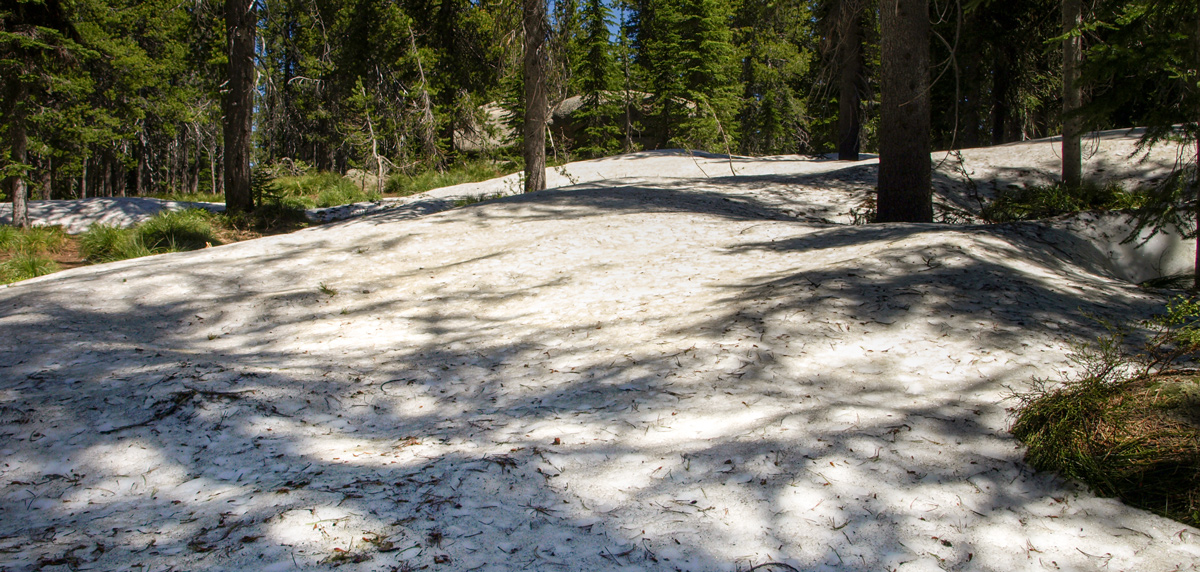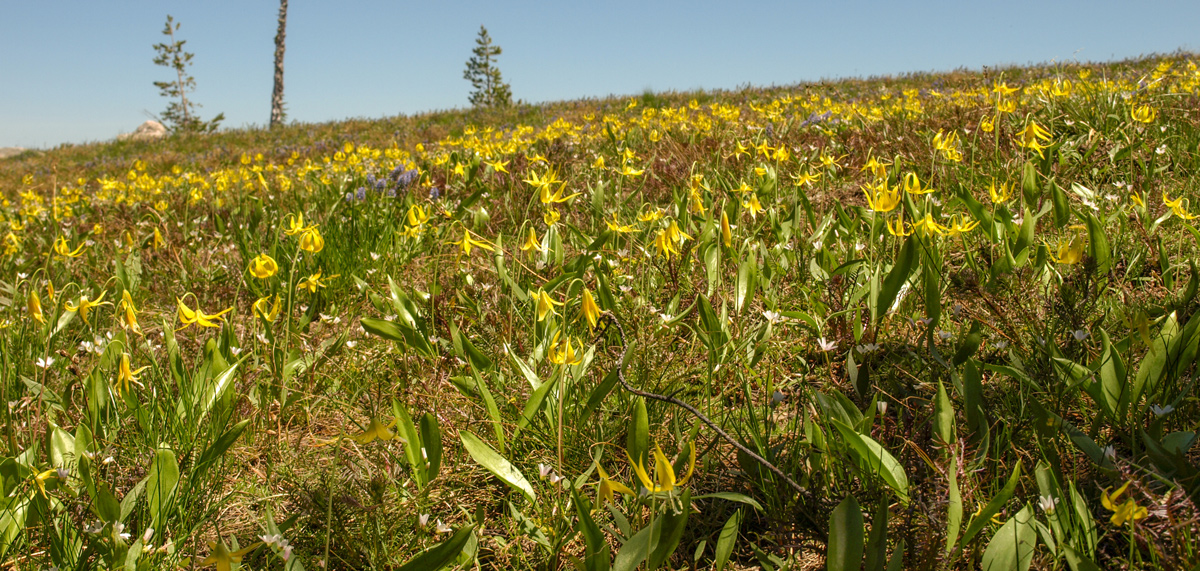Led by their Nez Perce guides, the expedition pauses at the Smoking Place where they see yellow glacier lilies and “Stupendeous Mountains” covered with snow. They push hard along Bitterroot Mountain ridges and encamp at Spring Mountain—Bears Oil and Roots camp. The captains apply a poultice made from wild ginger to Pvt. Potts’ badly swollen leg.
Stopping for a Smoke
by Yellowstone Public Radio[1]Originally aired weekdays by Yellowstone Public Radio during the Bicentennial observance of 2003-2006. Narrated by Hal Hansen. Scripts by Whit Hansen and Ed Jacobson. Produced by Leni Holliman. © … Continue reading
Indian Grave Meadow
© 30 June 2009 by Kristopher K. Townsend. Permission to use granted under the Creative Commons Attribution-Share Alike 4.0 International license.
Traveling Over Firm Snow
we renewed our march, proceeding over some of the steepest mountains I ever passed. The snow is so deep that we cannot wind along the sides of these steps, but must slide straight down. The horses generally do not sink more than three inches in the snow; but sometimes they break through to their bellies . . . . it appeared to me somewhat extraordinary, to be travelling over snow six or eight feet deep in the latter end of June. The most of us, however, had saved our socks as we expected to find snow on these mountains.
—Patrick Gass
Pausing at the Smoking Place
we halted by the request of the [Nez Perce] Guides a fiew minits on an ellevated point and Smoked a pipe on this eminance the nativs have raised a conic mound of Stons of 6 or 8 feet high and erected a pine pole of 15 feet long. from this place we had an extencive view of these Stupendeous Mountains principally Covered with Snow like that on which we Stood;
after haveing Smoked the pipe and Contemplating this Scene Sufficient to have dampened the Spirits of any except Such hardy travellers as we have become, we continued our march
—Meriwether Lewis
Pushing Hard
we arived at a Situation very Similar to our Situation of last night tho’ the ridge was Somewhat higher and the Snow had not been So long disolved of course there was but little grass. here we Encamped for the night haveing traveled 28 Ms. over these mountains without releiveing the horses from their packs or their haveing any food.
—Meriwether Lewis
Bears Oil and Roots
our Meat being exhosted we issued a point [pint] of Bears Oil to a mess which with their boiled roots made an agreeable dish.
—Meriwether Lewis
Wild Ginger Poultice
Jo. Potts leg which had been much Swelled and inflaimed for several days is much better this evening and givs him but little pain. we applied the poundd root & leaves of wild ginger from which he found great relief.
—Meriwether Lewis
Yellow Glacier Lilies
Erythronium grandiflorum
The Smoking Place, 30 June 2009. © by Kristopher K. Townsend. Permission to use granted under the Creative Commons Attribution-Share Alike 4.0 International license.
After hiking over numerous snowbanks, the photographer reached the Smoking Place to find this field of yellow glacier lilies on its northern slope. The Lolo Motorway was not yet open due to snow and blow downs.
Plentiful “Yellow lilly”
Near our encampment we saw great numbers of the Yellow lilly [glacier lily] with reflected petals in blume; this plant was just as foward here at this time as it was in the plains on the 10th of May.
—Meriwether Lewis
Weather Diary
State of the weather at rise
Wind at rise
State of the weather at 4 P.M. Wind at 4 P.M. fair after rain & thunder S E fair S E Thunder shower last evening some rain a little before dark last evening.
—Meriwether Lewis[2]To assist the reader of this web page, the date column is not presented and some abbreviations have been spelled out.
Smoking Place is a High Potential Historic Site along the Lewis and Clark National Historic Trail managed by the U.S. National Park Service. The site is in the Nez Perce-Clearwater National Forest and part of the Lolo Trail National Historic Landmark.
Notes
| ↑1 | Originally aired weekdays by Yellowstone Public Radio during the Bicentennial observance of 2003-2006. Narrated by Hal Hansen. Scripts by Whit Hansen and Ed Jacobson. Produced by Leni Holliman. © 2003 by Yellowstone Public Radio. |
|---|---|
| ↑2 | To assist the reader of this web page, the date column is not presented and some abbreviations have been spelled out. |




